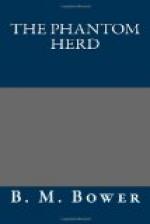He stopped at the bunk-house to tell the boys that they had nothing to do but eat breakfast before they saddled, and found them putting on overcoats and gloves and wrangling over the probable location of the herd that would have drifted in the night. So they ploughed in a straggling group to the house, where Annie-Many-Ponies was already pouring the coffee when they trooped in.
Day was just breaking when they rode out into the full force of the belated storm and up on the mesa where they had left the cattle scattered and feeding more or less contentedly at sundown. They had not gone a mile until their bodies began to shrink under the unaccustomed cold. Bill Holmes, town-bred and awkward in the open, thankfully resigned to the Indian girl the dignity of driving the mountain wagon with its four-horse team, and huddled under blankets, while Annie-Many-Ponies piloted them calmly straight across country in the wake of the riders whom her beloved Wagalexa Conka was leading on the snuffy bay. Save for the difference in his clothes, Annie-Many-Ponies thought that he much resembled that great little war-chief of the white people who rode ahead of his column in a picture hanging on the wall of the mission school. Napoleon was the great little war-chief’s name, and her heart swelled with pride as she drove steadily through the storm and thought what a great war-chief her brother Wagalexa Conka might have made, were these but the days of much fighting.
There was to be no trouble with “static” this time, if Luck could help it. To be doubly safe from blurred film, he had brought his ray filter along, for the flakes of snow were large and falling fast. He had chosen a different location, because of the direction of the wind and the difficulty the boys would have had in driving the cattle back in the face of it to the side hill where he had first taken the scenes of the drifting herd.
To-day he “shot” them first as they were filing reluctantly out through a narrow pass which was supposed to be the entrance to the box canyon where the two rustlers, Andy and Miguel, had kept them hidden away. Artistically speaking, the cattle were in perfect condition for such a scene, every rib showing as they trooped past the clicking camera cleverly concealed in a clump of bushes; hip bones standing up, lean legs shambling slowly through the snow that was already a foot deep. Cattle hidden for days and days in a box canyon would not come out fat and sleek and stepping briskly, and Luck was well pleased with the realism of his picture, even while he pitied the poor beasts.
Later he took the drifting of the herd, and he knew in his heart that the scenes were better than those he had lost. He took tragic scenes of the Native Son in his struggle to keep up and to keep going. He took him as he fell and lay prone in the snow beside his fallen horse while the blizzard whooped over him, and the snow fell upon his still face. In his zeal he nearly froze the Native Son, who must lie there during two or three “cut-back” scenes, and while Andy was coming up in search of him. When Andy lifted him and found him actually limp in his arms, the anxiety which a “close-up” revealed in his face was not all art. However, he did not say anything until Luck’s voracious scene-appetite had been at least partially satisfied.




